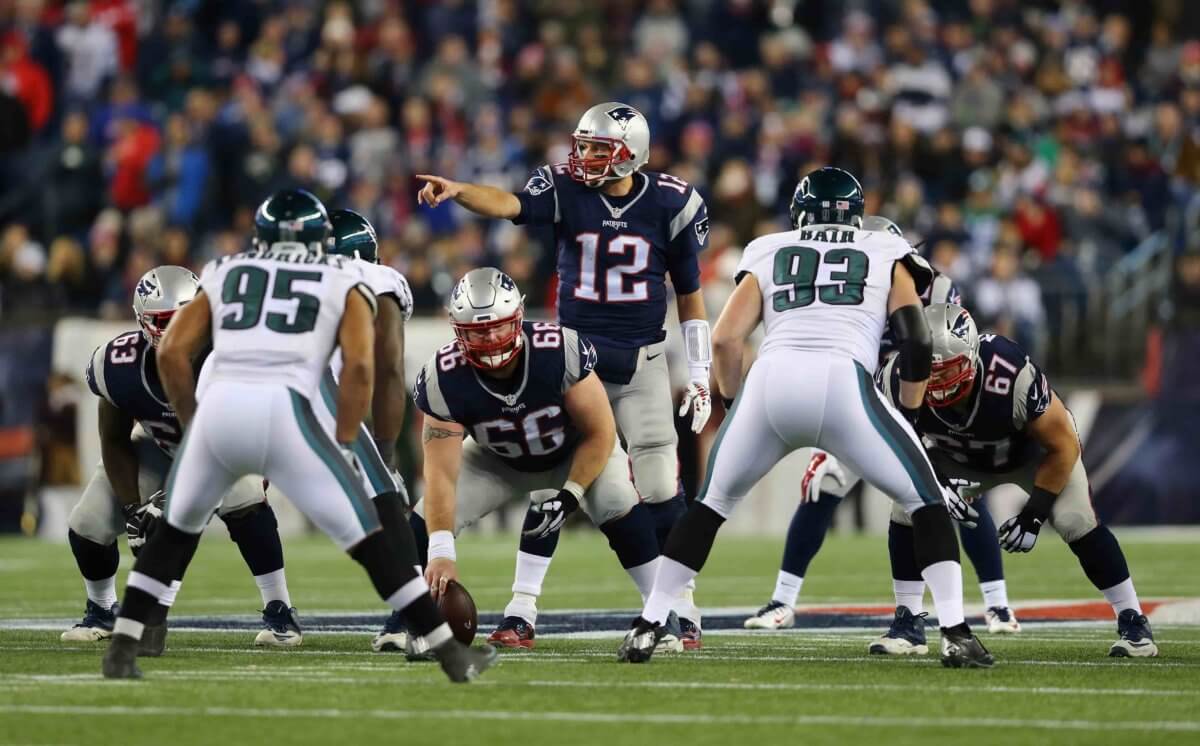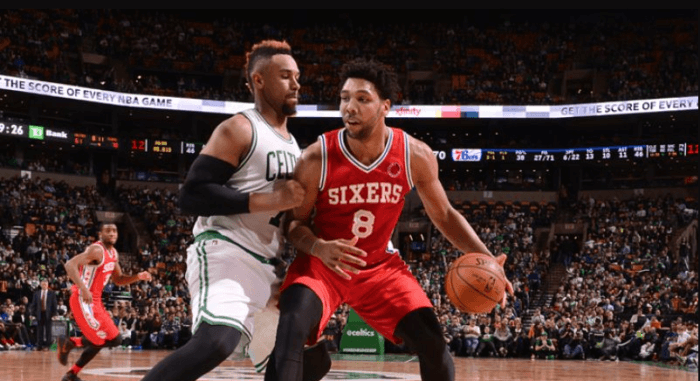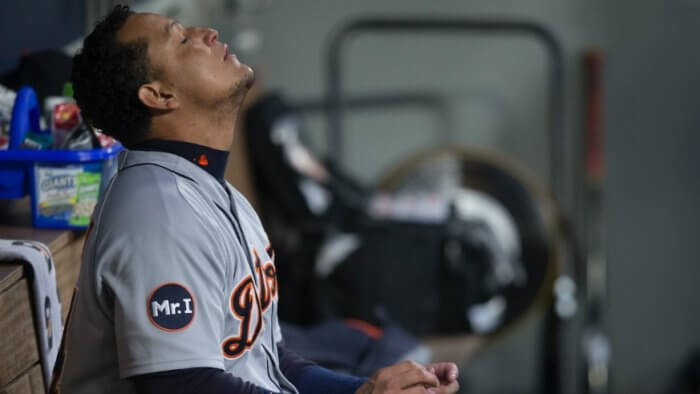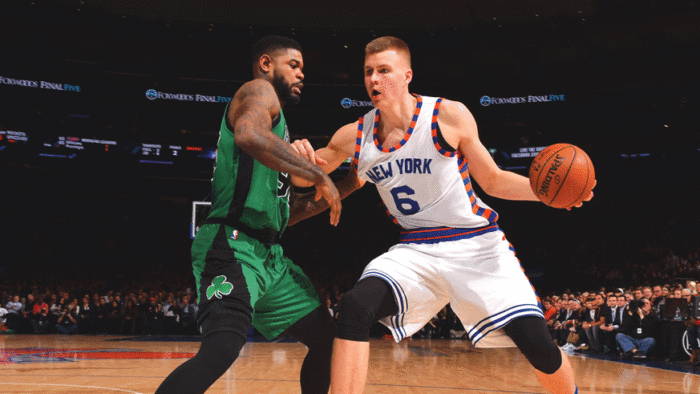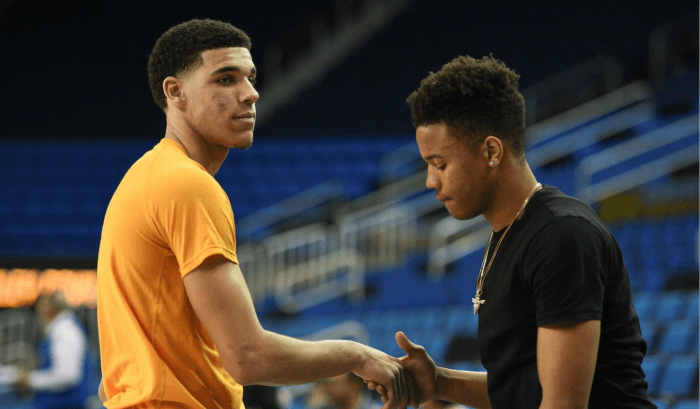If you were told one team won their conference championship game by 31 points, and the other needed two touchdowns in the fourth quarter to squeak to a four point victory, you might predict the former would be favored when the two met in the Super Bowl. And yet the Patriots are favored by more than a field goal. What makes the Patriots so great? What’s made the Eagles capable of upending the odds so far? And on what matchups does the big game figure to turn? We’ve got a preview:
When the Eagles Have the Ball
Pulling Offensive Linemen vs. Patriots Linebackers
The Eagles have put an emphasis on athleticism among their linemen since Andy Reid was in charge in Philadelphia. It became a necessity under Chip Kelly’s tempo offense and has remained key to a top three rushing attack under Doug Pederson. Having linemen who can move, get out in front of runners and engage at the second level has done as much to free up big runs and allow the Eagles to excel in the screen game for over a decade as having backs like Brian Westbrook, LeSean McCoy, and Darren Sproles have.
The Patriots run defense has generally excelled in the 2017 playoffs, holding Derrick Henry to 28 yards on 12 carries before Tennessee abandoned the rush and toughening after some early drives to prevent Jacksonville from running the clock out. Leonard Fournette finished with 76 yards on 24 carries. They were fairly vulnerable through the air however, as Jacksonville running backs totaled a combined 88 receiving yards.
Lane Johnson and Jason Kelce move out from under their original opponent and pull with agility and explosiveness, and at a frequency more often seen from guards. They won’t be facing linebackers from New England that are similar bastions of athleticism. Four of New England’s top five solo tacklers this season are member of the secondary. The lone linebacker in the top five is Kyle Van Noy, who shines more when he is getting after the quarterback than stretching out a run play.
This is a matchup where the Eagles have a direct advantage that might allow them to control the game offensively, as has been the case through two playoff games so far.
When the Patriots Have the Ball
The Four Man Rush vs. Tom Brady
Once you get past the helmet-catch of yore, the most enduring memory of the Patriots’ two Super Bowl defeats under Bill Belichick is Tom Brady running from Giants defensive linemen. In 2008, they sacked Brady five times, moving the Patriots back 37 yards in the process. In 2012, they sacked him twice and forced a safety via intentional grounding in the end zone, something that began the game with the exact tone with which the one four years ago had finished.
The key? They managed it with just linemen. Via defensive fronts that included Michael Strahan, Justin Tuck, Osi Umenyiora, and Jason Pierre-Paul they were able to harass and bring down Brady while keeping seven men in coverage. In 2008 it was necessary to contain Randy Moss and Wes Welker. In 2018 it’s become even more important to put as many bodies between the 40-year old quarterback and his receivers.
The Eagles are the best-equipped team to generate that pressure. Four linemen recorded at least five sacks this season, while Brandon Graham was pacing the team with nine-and-a-half. Four more brought down the opposing quarterback at least once. What’s more, they wrecked havoc once they got there. Graham and Chris Long alone forced six fumbles. In the NFC Championship Game, rookie Derek Barnett strip-sacked Case Keenum. This deep, dangerous front is the strongest similarity between the 2018 Eagles and the kryptonite of Super Bowls past for New England.
Danny Amendola vs. Patrick Robinson
Brandin Cooks and Rob Gronkowski may be more well-known, but Amendola has starred for the Patriots in their playoff run. His two touchdowns in the AFC Championship against Jacksonville matched his regular season total, and his 196 receiving yards across two postseason contests is almost a third of his 659 in 15 regular season ones. Both touchdowns came in the fourth quarter to bring the Patriots back, and both were from close range in the red zone.
Those plays were designed to get Amendola open from the slot, and if he lines up there against the Eagles, the majority of the coverage he’ll face will come from Robinson. The veteran corner signed a one-year deal with the Eagles and was an afterthought for much of the off-season. He’s been anything but since, and a four interception season culminated in a 50-yard return against the Vikings that completely switched the game’s momentum and kick-started a Philadelphia rout.
With no shortage of weapons on the New England offense, the Eagles can’t afford to double Amendola. If Robinson can’t stay with him, or if he finds the weak spot of a zone the way he did against Jacksonville, they’ll be in trouble.
Jalen Mills vs. the Deep Pass Interference
The Patriots have morphed as an offense in 2017. Cooks is in, Julian Edelman is out, and as much as they remain capable of beating an opponent with the dink-and-dunk (ask Tennessee) they’re throwing deep like they still have Moss racing up the sidelines. As Jacksonville found out two weeks ago, those deep balls can be just as damaging when they fall incomplete.
Inside the Jaguars six penalties for 98 yards were two pass interference calls that handed New England 68 yards. Put another play, pass interference was New England’s third leading receiver on the day. In 2017, including the postseason, the Patriots rank just fifth in the number of pass interference calls in their favor, with 14. But they lead the league in yards gained from such calls, picking up 355.
The Eagles are roughly middle-of-the-pack defensively when it comes to pass interference calls. They have the tenth fewest pass interference penalties in the league, and haven’t been called for one since Week 14 against the Rams. That one was committed by Mills, who has been the culprit on four of the Eagles seven flags this season. That puts him at a tie for eighth-most in the league.
The Eagles have actually been guilty of more holding calls defensively, something they did fifth most often in the league and that Mills placed second in the NFL in with four. Fortunately, that’s something that comes with far less consequences. The Eagles haven’t proved prone to the costly pass interference penalty this season, but they have to be on guard for the Patriots looking to exploit them deep, by any means necessary. Jacksonville hadn’t been prone to it either.
Before the Game Starts
Rob Gronkowski vs. NFL Concussion Protocol
The Patriots’ – and quite possibly, the NFL’s – most dangerous weapon left the AFC Championship Game with a concussion after making just one catch. While Gronkowski remains in the concussion protocol and has been held out of some practices, it’s hard to imagine the star tight end missing the Super Bowl, especially with two weeks to recover. That said, concussions are a tricky thing, and the league is under as much scrutiny as ever when it comes to player safety.
What’s certain is that Gronkowski playing (or sitting) changes the entire complexion of the game when the Patriots offense is on the field Sunday. We could write an entire article about five hypothetical Eagles matchups against Gronkowski and give him the advantage in all of them, be it against do-everything safety Malcolm Jenkins or hyper-athletic linebacker Mychal Kendricks. The tight end led New England in catches with 69, receiving yards with 1,084, and receiving touchdowns with eight despite missing two games.
The Patriots don’t have the depth at tight end (see: Martellus Bennett and the late Aaron Hernandez) they have in recent years that has allowed them to trot out two tight-end sets featuring multiple pro-bowlers. If Gronkowski can’t go, their next option is former Colt Dwayne Allen, who had ten catches for 86 yards this season.
It would also be a crushing blow to lose Gronkowski as a run blocker. The Patriots are already a team with a tendency to abandon the run in favor of the short passing game, and against the NFL’s third ranked rushing defense they may go the same route they did against Jacksonville (13 carries by running backs for 43 yards) if they don’t have their tight end available to pave the way.



